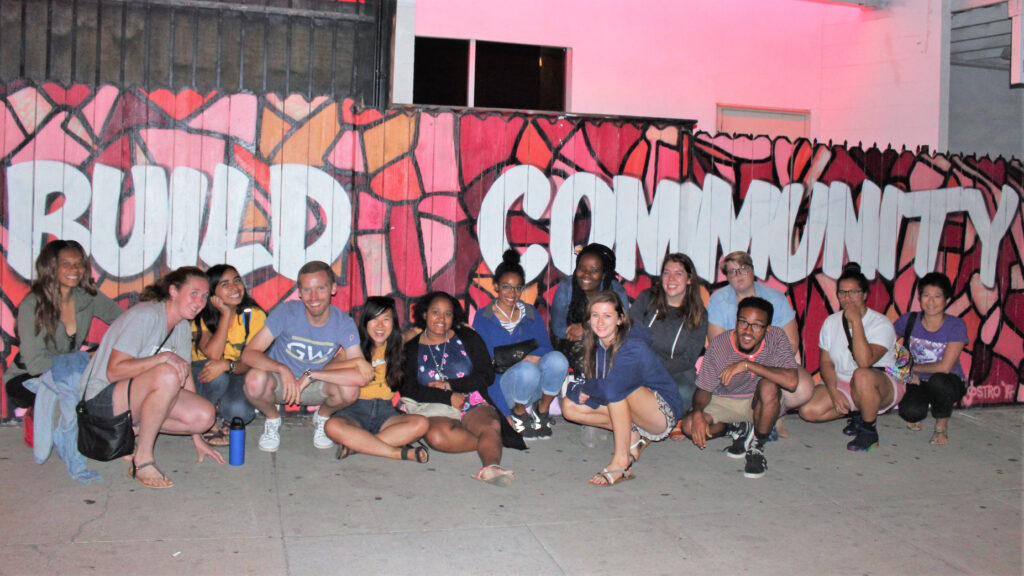
JYLA interns gather next to a wall mural that states their mission: building community. Photo: JYLA
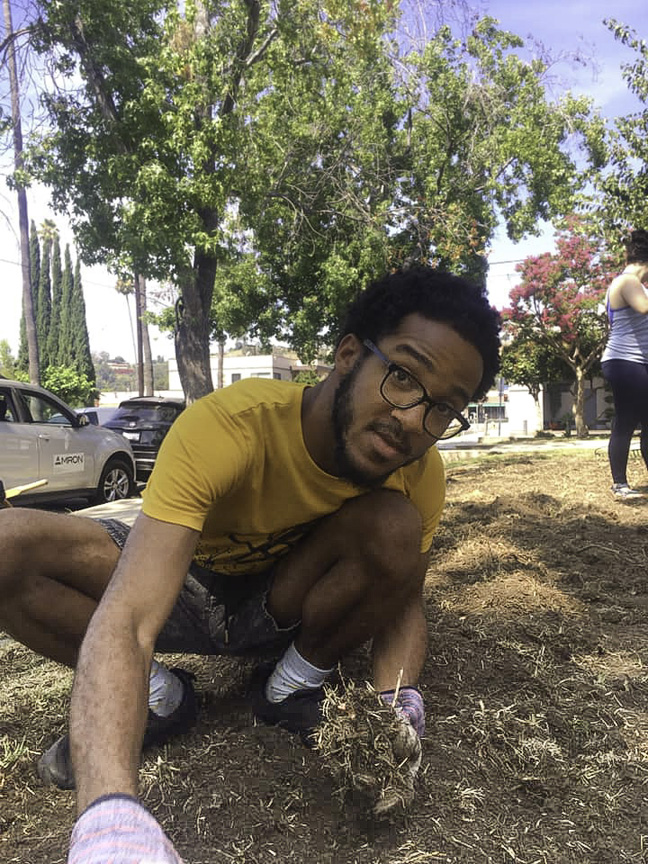
Rodell Jefferson, former intern, tends the garden at St. Be’s, Eagle Rock, where he worked after his JYLA year. Photo: Payton Hoegh
[The Episcopal News] Rodell Jefferson had earned a bachelor’s degree from Brown University in Providence, Rhode Island, in 2018, but like many young adults still wondered, “what do I do now?”
“I kept saying I just want to love people for a living,” Jefferson told The Episcopal News recently. “People were telling me, ‘you’re going to be a pastor,’ or ‘go to divinity school.’ Not being particularly religious or even knowing what divinity school was, I thought it was crazy.”
Then Jefferson, originally from Detroit, Michigan, discovered Jubilee Year Los Angeles, a transformative year of service, activism, personal and spiritual growth, and vocational discernment. The program, originally founded in 1991 as the Episcopal Urban Intern Program by former Los Angeles Bishop Fred Borsch and the Rev. Canon Gary Commins, celebrates its 30th anniversary this year.
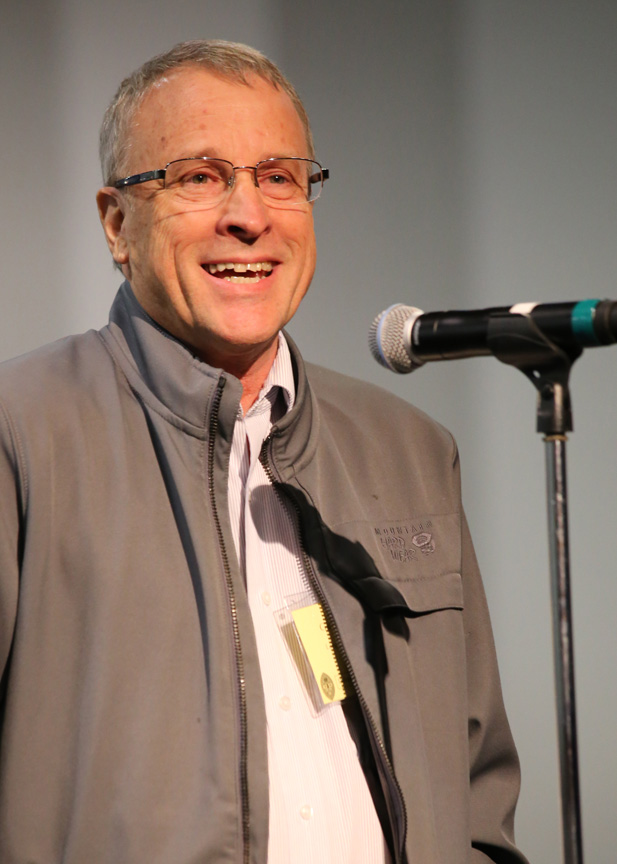
EUIP founder Gary Commons addresses the 2014 meeting of Diocesan Convention. Photo: Janet Kawamoto
Commins, then rector of Holy Faith Church in Inglewood, recalled “conversations with Fred Borsch, (who) tried to get The Episcopal Church to start a national program in the 1980s. We had this rectory that had been converted to office space. I thought, why don’t we see if we could at least start a program here.”
To mark its 30-year milestone, JYLA invites the diocesan community to a virtual event and fundraiser from 3 to 4 p.m. on Saturday, Feb. 19. A second event is planned in Spring 2022 to honor Commins and the Rev. Canon Joanne Leslie, former archdeacon of the diocese, co-founder of Jubilee Consortium (now celebrating its 20th anniversary) and chair of the JYLA board.
“February 19 will be a time online for us to gather, share some stories and testimonies about Jubilee and JYLA, and encourage one another to generously give a financial contribution to ensure that the work of Jubilee and JYLA continues strong and long into the future,” says the event announcement.
“We are even setting aside some time during the event for JYLA alumni (as well as friends, supporters, former staff) to join a virtual Reunion Room where they can greet and catch up others from their own or surrounding program years.”
There is no charge for the online event, but donations are welcome and appreciated. For access to the link, click here and select “purchase tickets.”
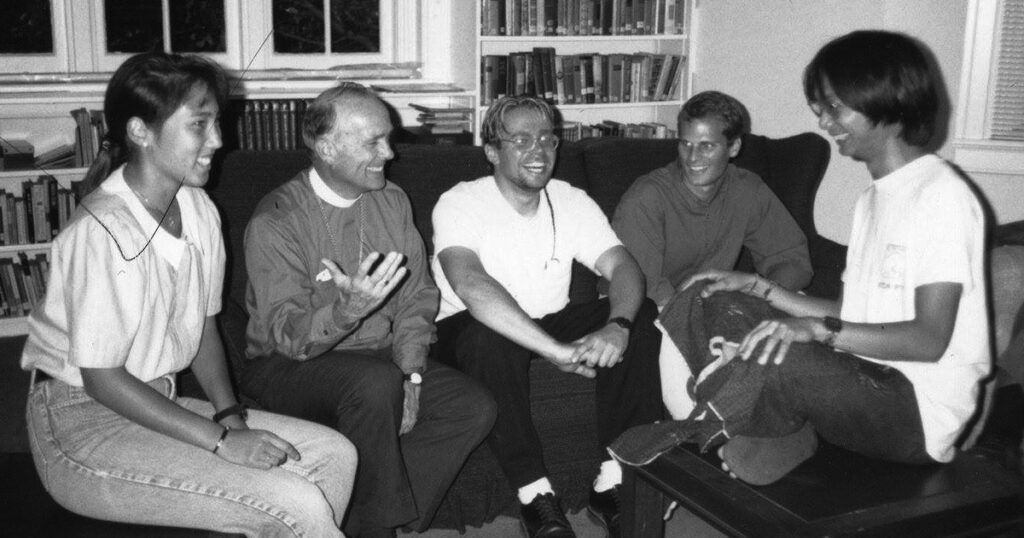
Frederick H. Borsch (second from left), fifth bishop of Los Angeles and founder of the Episcopal Urban Intern Program (EUIP), chats with some of the original group in 1991. File photo
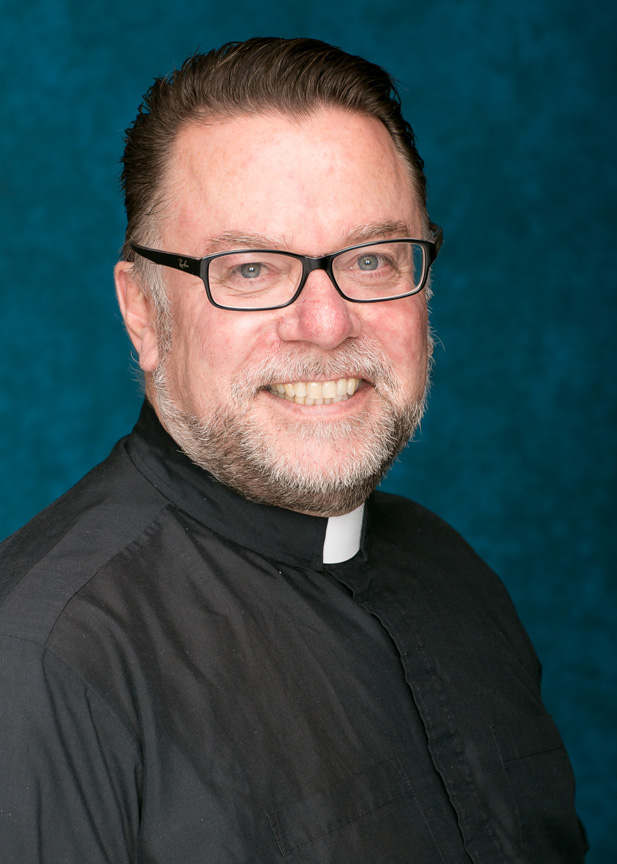
Jaime Edwards-Acton, rector of St. Stephen’s Church, Hollywood, and founder of the Jubilee Consortium, was a member of the first EUIP group. Photo: Cam Sanders
A year of service
More than 250 young adults from all over the world have participated in EUIP/JYLA, touching an estimated 10,000 lives through partnerships with more than 50 like-minded greater Los Angeles service organizations. Young adults spend a formative year living in intentional community, working for a wide range of area nonprofit service organizations, and learning to be changemakers in the world.
Bill Pitkin, 53, and the Rev. Canon Jaime Edwards-Acton, co-founder of the Jubilee Consortium and rector of St. Stephen’s, Hollywood and priest-in-charge at St. Be’s, Eagle Rock, were in that first group, living in community at Holy Faith’s rectory.
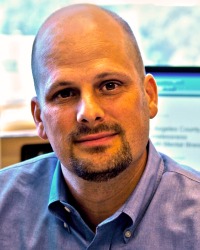
Bill Pitkin, a member of the first EUIP class, continues his service to the community as a senior policy fellow for the Urban Institute. Courtesy photo
Assigned to serve as a teacher’s aide at Hillsides, an institution of the Episcopal Diocese of Los Angeles serving children and young adults who have suffered trauma, Pitkin learned “a lot about working with young children who couldn’t quite function in regular school due to trauma.” The dedication of teachers there inspired him to go to Ecuador the following year, and work with an Episcopal church there at a school start-up, said Pitkin, now a senior policy fellow for the Urban Institute.
The year also changed his understanding of systemic racism, added Pitkin, who is white. Holy Faith’s members hailed from 26 different countries and the church’s proximity to the 1992 L.A. riots, were formative. “I learned a lot about our place as a community and church and having a role in being a place of healing and fighting for racial justice … and about my place and privilege and the need to address not just the symptoms of injustice but really the injustices themselves.”
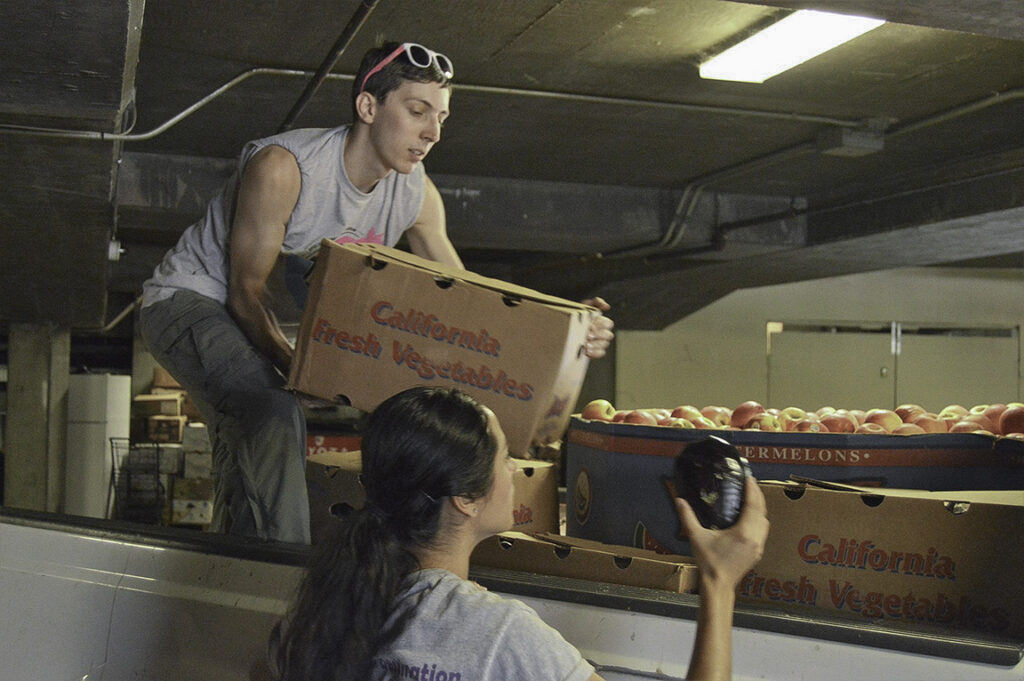
JYLA interns collect produce for a food bank. Photo: JYLA
Edwards-Acton, who now heads JYLA as part of the Jubilee Consortium, said the program has grown over the years to as many as many as 28 young adults living at five different church locations, Their host work sites included diocesan institutions like the Seeds of Hope food justice ministry, Interfaith Refugee and Resettlement Service (IRIS), Episcopal Enterprises and also My Work to Do, an online affinity group designed to help white people build stamina for discussing racism, systemic injustice, racial healing, reconciliation, and justice in their everyday lives.
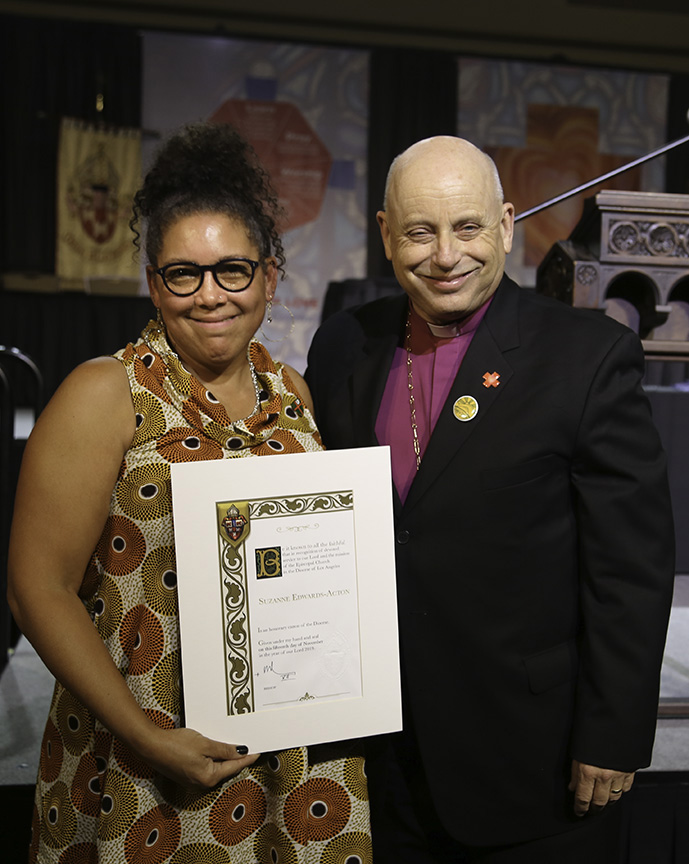
Bishop John Harvey Taylor names former JYLA program director Suzanne Edwards-Acton an honorary canon of the Diocese of Los Angeles in 2019. Photo: Janet Kawamoto
Canon Suzanne Edwards-Acton, founder of My Work To Do and a former charter school principal, has served as JYLA program director, site leader and spiritual mentor. She said not all corps members have been Christian, and it is not a requirement. Some have been Muslim, Jewish, Buddhist or agnostic.
“Some people come here because Jesus is the center for them, because their spiritual life drew them to that,” she said. “Others cared about social justice, and some came because they want to be in L.A., and some because they didn’t have a place to go.”
There are some “who come from money and see how hard it is to live on a stipend. For a few people, it was more than they had ever had. One person loved the house in Inglewood; it was the first time she’d ever lived in a house with a backyard.”
Afterwards, “they see life with a different critical lens,” she said. “A lot of people realize how the transition into their professional life, having a job, is not as easy as maybe they thought it was going to be.”
Queen Simmons, 28, was looking for a fresh start, some 2,400 miles away from her Savannah, Georgia, birthplace, but L.A. felt “like a homecoming” during the 2020-2021 year, in spite of the pandemic.
“I felt embraced by the program and here I am, a year out of it and I am still very much a part of it. I still attend food distributions, church services and other events. I’ve grown such a bond with the Jubilee Year and the social justice community as well as all the other communities we touch.”
That community includes “social justice and spiritual and self-development, mentors and educational and health resources and mental health resources,” added Simmons, who has continued to live in L.A. and is working with the Jubilee Design Collaborative, another of the consortium’s efforts. “I’ve been able to embrace multiple career objectives.
“Before it was like, OK, you’re out of college, you’re doing a lot of things to build up a resume. But during JYLA I leaned more into what I’ll do for the rest of my life.”

A new class of interns jumps for joy beside Echo Park Lake during orientation at St. Paul’s Commons, ministry center of the Diocese of Los Angeles. Photo: Payton Hoegh
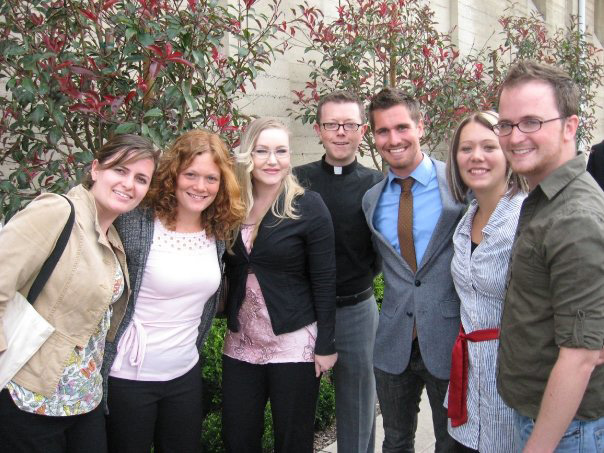
Interns pose at St. John’s Cathedral with Jason Cox, center, a former JYLA director who now is rector of St. Luke’s Church, San Francisco. Photo: JYLA
Helping young adults imagine a different future
Some former corps members, like the Rev. Jason Cox, already had a clear sense of vocation, but joined JYLA as a way of discernment, exploration and action.
JYLA “allowed me to get out into the world and to do work that was directly related to what I felt God was calling me to do to bring good news to people who really needed it on the street,” said Cox, 42, a former JYLA director (2007-2011) and now rector of St. Luke’s Church in San Francisco.
Serving on L.A.’s Skid Row as a corps member enabled him later to “read the bible and learn theology in a different way because of that real-world perspective of sitting face to face with poor people day by day.”
The experience “continues to affect the way I think about the world, about money and poverty, the way I vote. It affects the way I talk about it with my parishioners. There is this ripple effect that goes on.”
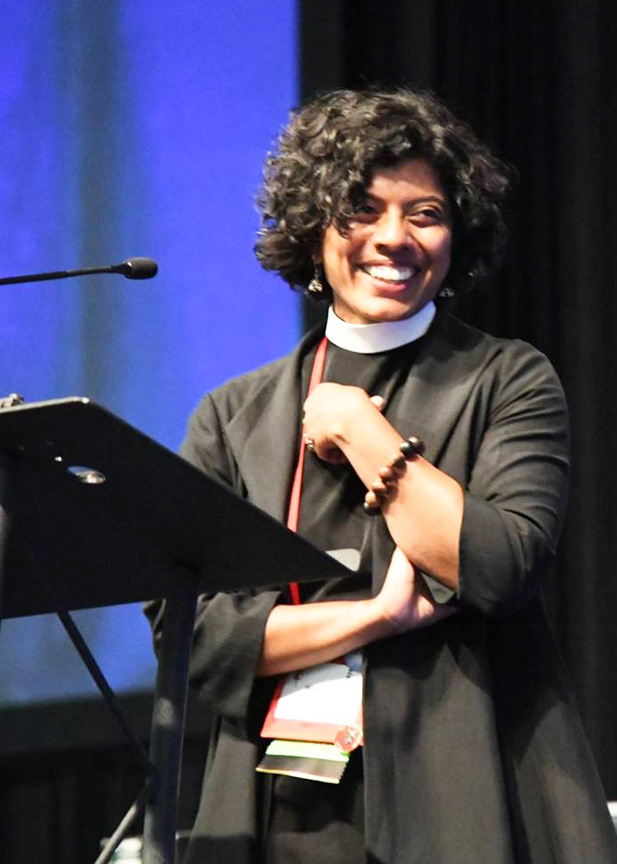
Former intern Winnie Varghese, rector of St. Luke’s Church, Atlanta, addresses the 2018 General Convention in Austin, Texas. Photo: Brian Baker
Similarly, the Rev. Winnie Varghese, rector of St. Luke’s Church in Atlanta, considered joining the Peace Corps but opted instead for the JYLA 1994-1995 year.
“My parents were immigrants from India, and I was curious about what it meant to be a Christian adult in America,” she recalled. Reared in Dallas, Texas, “I was figuring out how to be a citizen and a Christian.”
Serving “at a project with people who were unhoused and living with mental illness dismantled every thought of what I had to do, for safety, privilege, a sense of entitlement as a middle-class person with access to education,” she recalled. “It helped me understand myself as an adult with agency, to understand a side of America I hadn’t seen.”
The program also offered invaluable mentors among the Holy Faith congregation and built lasting relationships.
“I feel so fortunate for that generous parish, Holy Faith, that took space to mentor and support us, and for Bishop Borsch and Gary Commins and the others who put the program together, and for the community that gave us space to explore and to screw up and to learn,” she said. “I can’t imagine what my adult life would have been without being completely shaped by it.”
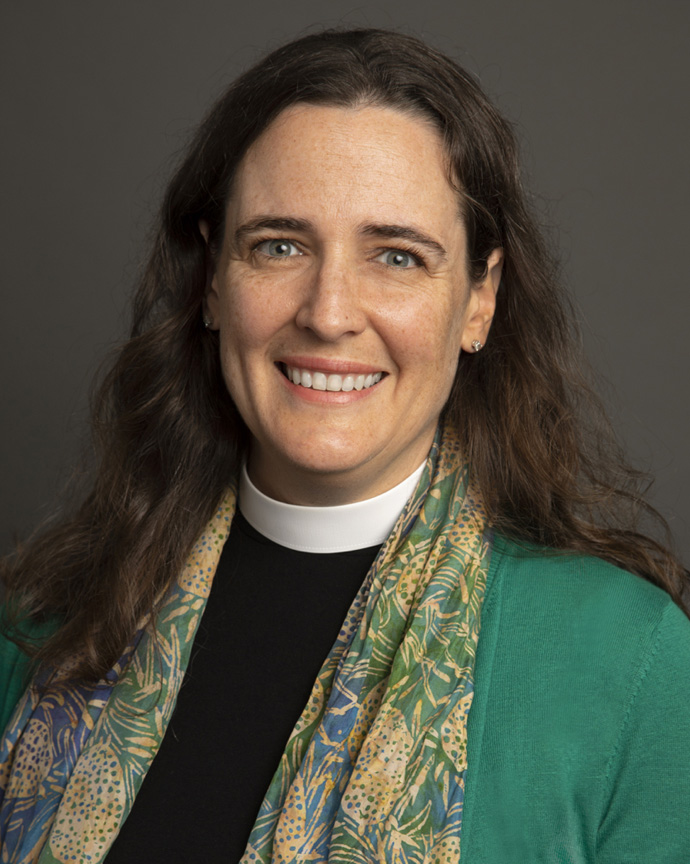
Former intern Jennifer Reddall is now bishop of the Diocese of Arizona. Courtesy photo
Practicing theological reflection, asking challenging questions, while engaging systems as a lived reality, “taught me not to be a fixer, not to have a ‘right’ way, or to eye people as if they’re a problem,” she added. “Solidarity is being with. I didn’t know how to do that before. I didn’t understand that I wasn’t doing it. Programs like this at their best equip us to see people from very different circumstances than ours with autonomy, dignity and give us a space to hear them.”
Varghese preached at the March 9, 2019, consecration of Arizona Bishop Jennifer Reddall, also a JYLA alumna.
For Reddall, a Yale University theater studies graduate who was baptized at St. Francis’ Church, Rancho Palos Verdes, JYLA (1997-1998) meant “for the first time I was in an environment where it was normal to be faithful and to want to do things like say the daily office or pray. That was incredibly validating.”
The program was a transformative way of “not getting sucked into the expectation that you have to graduate from college and go make a lot of money and set yourself on a certain path,” recalled Reddall, 46, a 2002 graduate of General Theological Seminary. Serving at the Hillsides Education Center in Pasadena “taught me a lot about inequity and injustice. It was really shaking up my sense of how inequitable the world was” and kindled a passion for urban ministry that continues to shape her episcopacy.
“I really enjoy being the bishop of a diocese that has an Episcopal Service Corps program. When I meet the beloveds, there’s this shared experience. I am really grateful for that, and grateful for being able to help encourage them in their vocations as they discern them.”
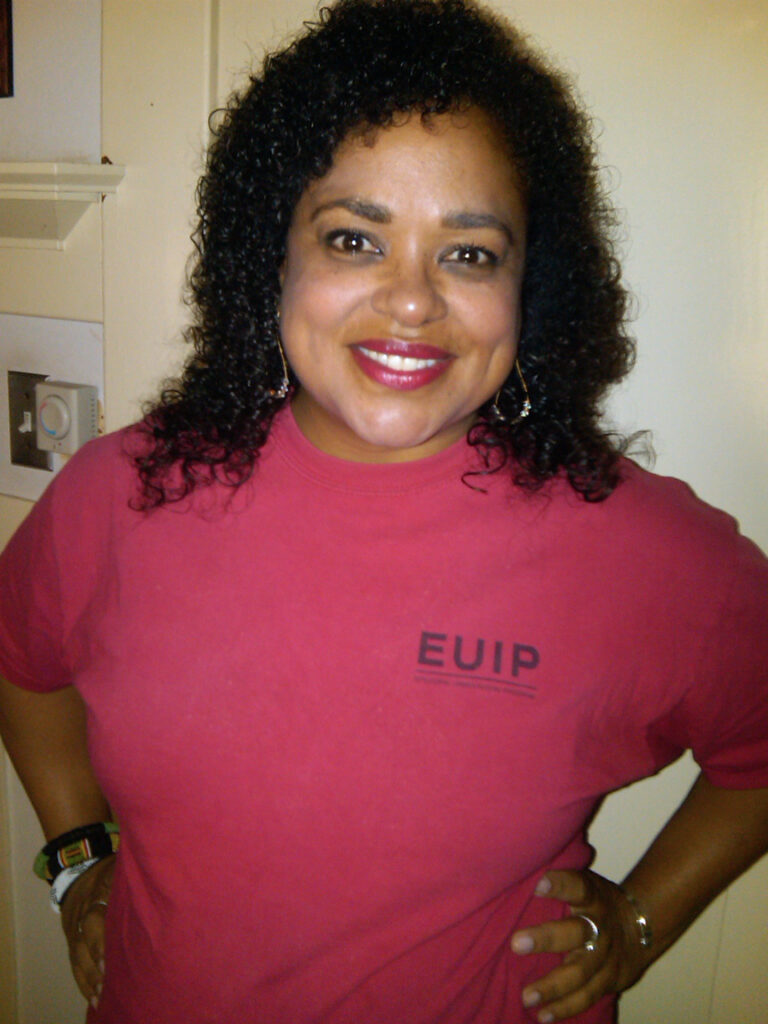
Altagracia Perez-Bullard served as a director of JYLA and rector of Holy Faith Church, Inglewood. File photo
The Rev. Altagracia Perez-Bullard, formerly a Holy Faith rector and JYLA director, said the value of youth service corps and faith communities is reciprocal.
“The young people involved in JYLA got a chance to learn about the issues that affect urban life, to learn about how the church serves in that context, to be part of an organization trying to improve the quality of life, especially for those on the margins. It’s an amazing experience.”
Conversely, the energy, questions and passion brought by a group frequently absent from church attendance are essential. “The members of the congregation loved having young adults.
“Even the questions they asked me or the other church leaders, why do we do what we do and how, made us more reflective,” said Perez-Bullard, Virginia Theological Seminary director of contextual ministry and assistant professor of practical theology. “It was good for us.”
Her students with service corps experience display “a depth about their vocation, whether it’s lay or ordained, that comes from having lived in a community that reflected together, prayed together,” she said.
And program impact on young people’s lives “is pretty exponential,” she added. “It’s wonderful to get to impact so many people who are going to do ministry. It is a really important ministry that we need to be a part of, need to invest in and everybody is blessed by the experience.”
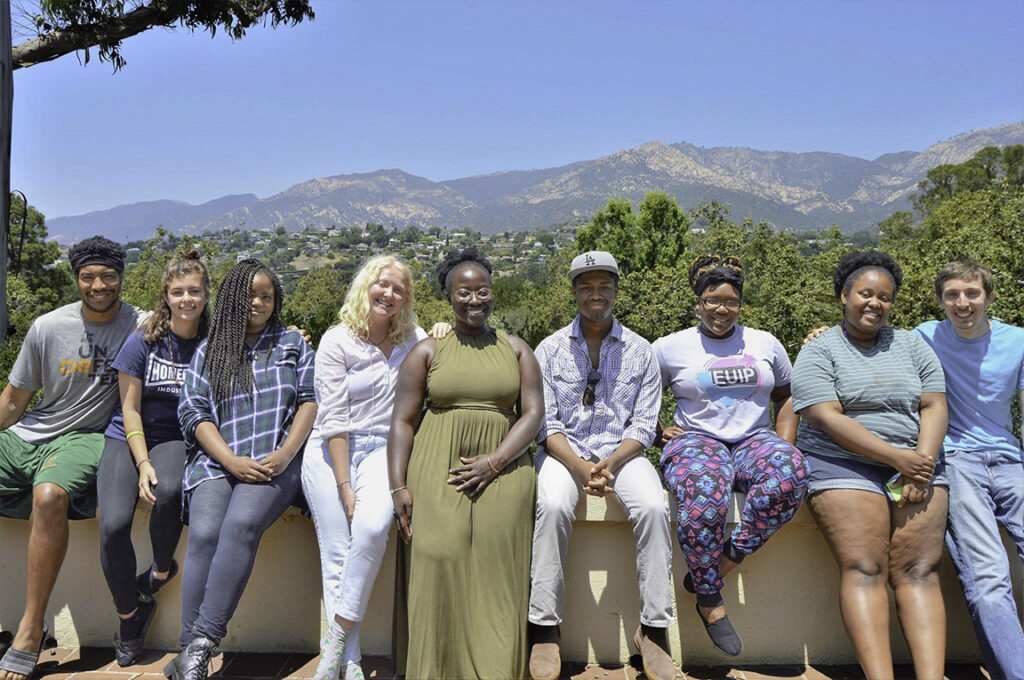
A recent intern group gathers for a photo with a Southern California mountain backdrop. Photo: JYLA
Rodell Jefferson, now in his second year of seminary at Emory University’s Candler School of Theology, says the St. Stephen’s, Hollywood, community was just such a blessing. “I received so much support. I had so much fun. I have a lot of love for that community and everything it opened up for me.”
After concluding his JYLA s year, he served as community coordinator for St. Be’s Church in Eagle Rock “a cool hands-on, on-the-ground experience,” he said.
“It came from relationship, from being with people, telling them my interests, where I feel called, and led. I am a part of not just the community I entered with, but what is now a 30-year-old community of people who had this unique experience of serving in L.A. That’s amazing to me and to think that that community is still growing and reaching out and connecting. That’s really cool.
“The blessing, the lesson I learned from JYLA is; people will show up for you.”
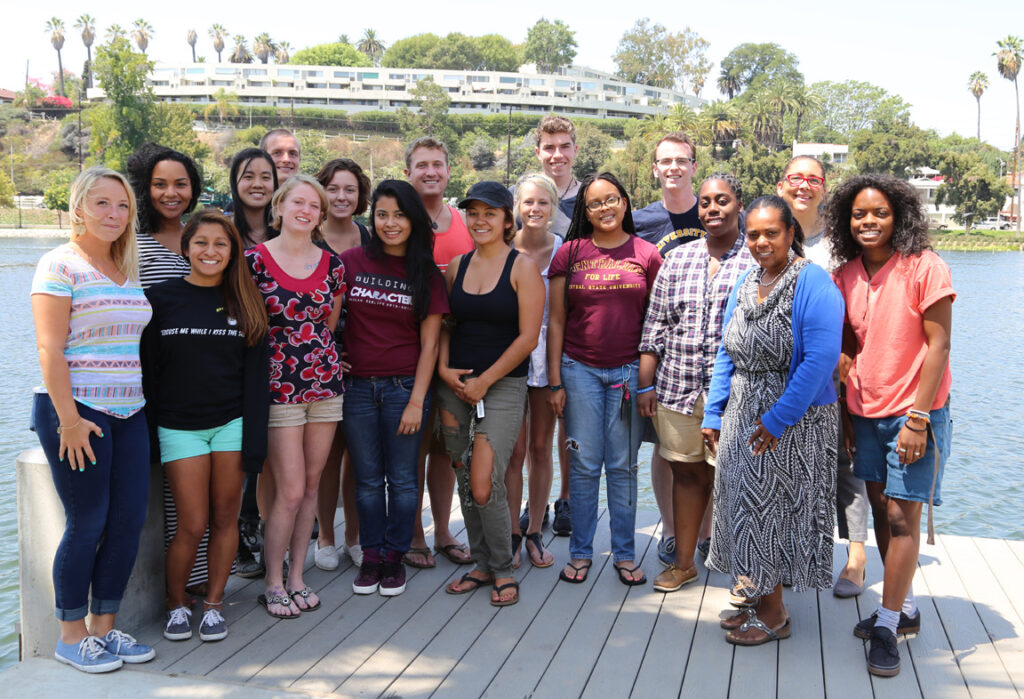
The 2014 class of EUIP interns poses by Echo Park Lake during their August orientation meeting. Photo: Janet Kawamoto
